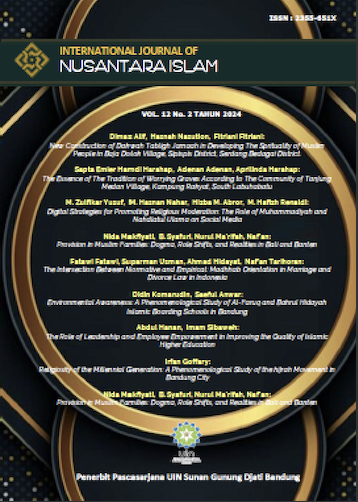Integrative-Islamic Learning Model for Hadith Education through Wawacan Panganten Tujuh
Main Article Content
Abstract
This research is motivated by the importance of developing a hadith learning model that is relevant to the local cultural context, especially in Indonesia, which is rich in cultural diversity. Wawacan Panganten Tujuh as an Islamic-based literary manuscript from Sundanese culture was chosen as a potential teaching material to enrich the hadith learning method. The integrative-Islamic pedagogy approach is used to integrate cultural values and Islamic teachings in the learning process, which is expected to increase students' understanding of hadith as well as strengthen their appreciation of local culture. The results of the study show that the learning model developed is not only effective in improving the understanding of hadith, but also provides a meaningful learning experience through the active involvement of students in their cultural context. This model combines the exploration of Sundanese culture with the teachings of hadith, allowing students to understand Islamic teachings in a more in-depth and contextual way. Unlike previous studies that only emphasized cultural aspects or content analysis, this study presents a holistic approach that integrates both aspects in a single learning model. The conclusion of this study confirms that the hadith learning model based on Wawacan Panganten Tujuh through an integrative-Islamic pedagogy approach is able to answer the needs of contextual Islamic education in Indonesia. The contribution of this research expands the scope of cultural-based Islamic education literature, although its implementation is still limited to certain areas. Further research is expected to develop similar models for other cultures and analyze the impact of their application more broadly in Islamic education
Article Details
The Authors submitting a manuscript do so on the understanding that if accepted for publication, copyright of the article shall be assigned to International Journal of Nusantara Islam, Sunan Gunung Djati State Islamic University.
The copyright encompasses exclusive rights to reproduce and disseminate articles in all forms and media, including reprints, photographs, microfilm, and similar reproductions, as well as translations. Some or all of the contents of this journal can be stored in databases and transmitted in any form and media without the need for written permission from the International Journal of Nusantara Islam, Sunan Gunung Djati State Islamic University.
The Editors and the Advisory International Editorial Board make every effort to ensure that no wrong or misleading data, opinions or statements be published in the journal. In any way, the contents of the articles and advertisements published in the International Journal of Nusantara Islam (IJNI) are sole and exclusive responsibility of their respective authors and advertisers.
References
Asrifan, Andi, Prodhan Mahbub Ibna Seraj, Andi Sadapotto, Nurhumairah, and K. J. Vargheese. 2023. “The Implementation of Kurikulum Merdeka as The Newest Curriculum Applied at Sekolah Penggerak in Indonesia.” IJOLEH: International Journal of Education and Humanities 2(1):62–74. doi: 10.56314/ijoleh. v2i1.130.
Bowen, Glenn A. 2009. “Document Analysis as a Qualitative Research Method.” Qualitative Research Journal 9(2):27–40. doi: 10.3316/QRJ0902027.
Brifkani, Isra. 2023. “Islamic Pedagogy for Guidance and Transformation: Toward an Islamic Experiential Learning Model.” Journal of Education in Muslim Societies 5(1):106–12. doi: 10.2979/jems. 2023.a911233.
Burke III, Edmund. 1979. “Islamic History as World History: Marshall Hodgson, ‘The Venture of Islam.’” International Journal of Middle East Studies 10(2):241–64.
Clark, Phillip G. 2006. “What Would a Theory of Interprofessional Education Look Like? Some Suggestions for Developing a Theoretical Framework for Teamwork Training.” Journal of Interprofessional Care 20(6):577–89. doi: 10.1080/13561820600916717.
Csikszentmihalhi, Mihaly. 2020. Finding Flow: The Psychology of Engagement with Everyday Life. Hachette UK.
Dewey, John. 1986. “Experience and Education.” Pp. 241–52 in the educational forum. Vol. 50. Taylor & Francis.

